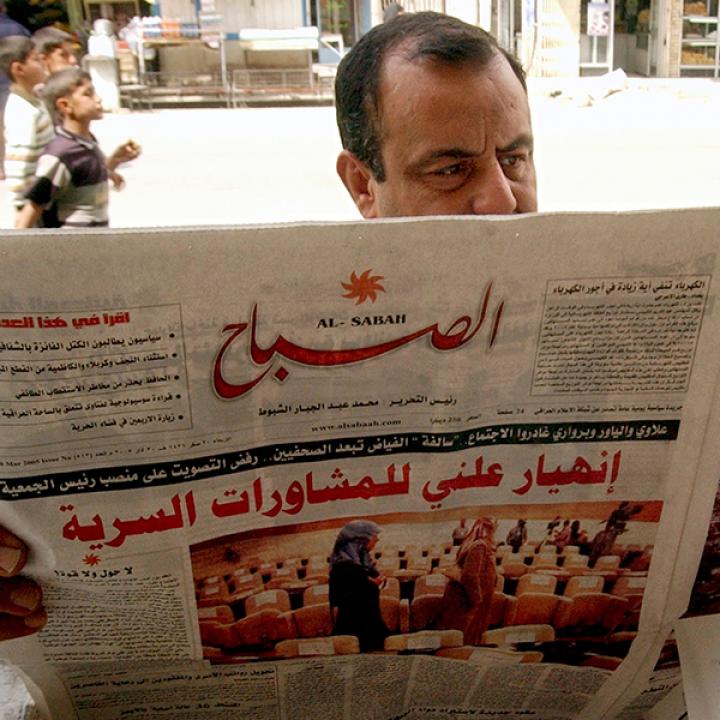
- Policy Analysis
- Articles & Op-Eds
The Future of the Iraqi Ba'ath Party

March 3, 2016
Could one of Iraq’s most notorious political parties make a comeback after thirteen years in exile? This may increasingly become a central question for Middle East analysts, as Ba’athists are claiming their sociopolitical platform of supporting pan-Arab causes defused sectarianism and united Iraqis around nationalistic themes. They also assert that their brand of secularism distanced mainstream Shiites from radical Iranian political currents and helped integrate Iraq’s many minorities into the private and public sectors.
History acutely belies this narrative, most visibly when Saddam Hussein rushed to reorient his regime from its prior secularism to Islamism in the aftermath of the Gulf War. In the Iraq of the early 1990s, Saddam urged his deputies to incorporate religiously-charged language into their speeches and ordered TV channels to broadcast clips of him praying, visiting Mecca, and holding the Quran. The regime’s war with the Shiite Iran had made it eager to distinguish itself from the enemy, with Iraq’s Shiite majority suffering as a result. In this sense, Ba’athist policies of merging religion with politics have served as one of the origins of the sectarian politics that have flourished in post-2003 Iraq.
Despite this history, some members of the reorganized Ba’ath Party, keen on lowering sectarian tensions and steering the party away from Islamic fundamentalists, are acknowledging that Saddam went off track. And while the Iraqi Ba’ath Party’s role in implementing the crimes of Saddam is undeniable, the Ba’ath party’s nationalist sentiment still resonates with many Iraqis frustrated by foreign meddling and internal corruption. Ba’ath Party founder and Christian liberal Michel Aflaq envisioned that the Ba’ath party’s tenants would protect religious liberties and promote civil rights. Both Iraq and ultimately the party suffered when Saddam hijacked Aflaq’s movement to advance his own interests and built an elaborate cult of personality.
After the collapse of Saddam’s regime in 2003, Iraq received a new constitution implemented in 2005 that effectively banned the Ba’ath party. This ban has held strong through the past decade, with Iraqi leaders and Iran refusing to bend the constitutional ban. In certain cases, former Ba'athist officers have sought to reestablish power in the sunni north of Iraq by collaborating with ISIS forces, but they are operating in complete opposition to the original Ba'ath movement's staunchly secularist message.
Iraq’s constitution now has little relevance and respect from Sunnis, Shiites, and Kurds alike. Ayatollah Ali Sistani’s 2014 fatwa, “Call to Arms-Popular Mobilization” exemplifies how religious imperatives can trump legal ones for Iraq’s Shiite majority. Sunnis dismiss the constitution as an “American tool,” and Kurds routinely threaten Baghdad with succession from Iraq and annexation of the oil-rich and hotly contested region of Kirkuk. The unrelenting and adamant insistence on a ban of any iteration of the Ba’ath party makes little sense when the rest of the country is in shambles.
Presumably the American government, so instrumental to the overthrow of Saddam’s regime in 2003, would balk at a return of his former party in 2016. But the United States administration should have learned in the last decades that some groups and establishments will become loyal to America when the United States has provided support. In less than three years, Egypt saw three different presidents – Mubarak, Morsi, and Sisi, but all of these men have wisely prioritized Egypt’s special relationship with the United States over their vastly different ideological leanings. The royals of Morocco, Saudi Arabia, and Jordan have also been immutable American allies. Even Saddam, once a partner of the United States, defeated the Soviet-allied Iraqi communist party and offset the spread of the Iranian Islamic Revolution in Iraq. If brought back into the political process, a new Ba’athist party might once again be used to crush radical political and religious ideologies and movements in Iraq, this time avoiding the pitfalls of Saddam’s regime and returning as an ally to the west and helping to develop a re-stabilized, united Iraq in the face of ISIS and the destabilizing sectarian forces.
No political movement with some traction is worth ruling out, especially in a country that has been run into the ground by the Da’wa Party term after term. As a powerful Iraqi politician put it in a highly publicized TV interview, “Every powerful Iraqi politician has stolen from the state and accepted bribes, even me.”
If Iraqis and the international community hope to keep Iraq as a functional country, there must be an end to the double-standards for political groups, a reorganizing of the Ba’ath Party, and a return to a functional political process for Iraq that makes sense and draws on its historical strengths as well as a continued commitment to the country's tenuous democracy.
Dani Tahrawi has served as the editor-in-chief of the Iraq Monitor since 2014. This item was originally published on the Fikra Forum website.
Fikra Forum


